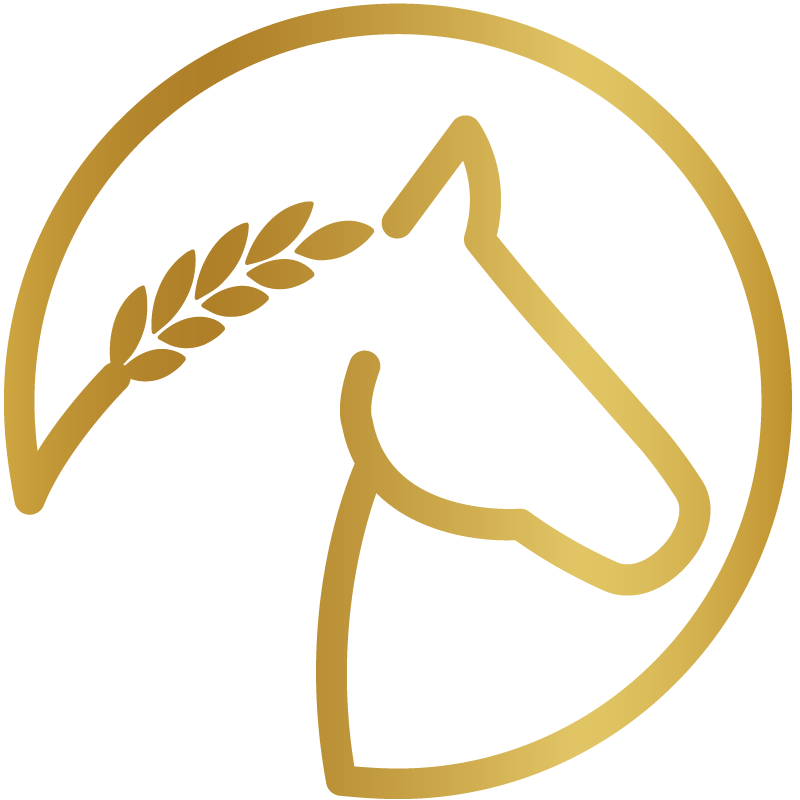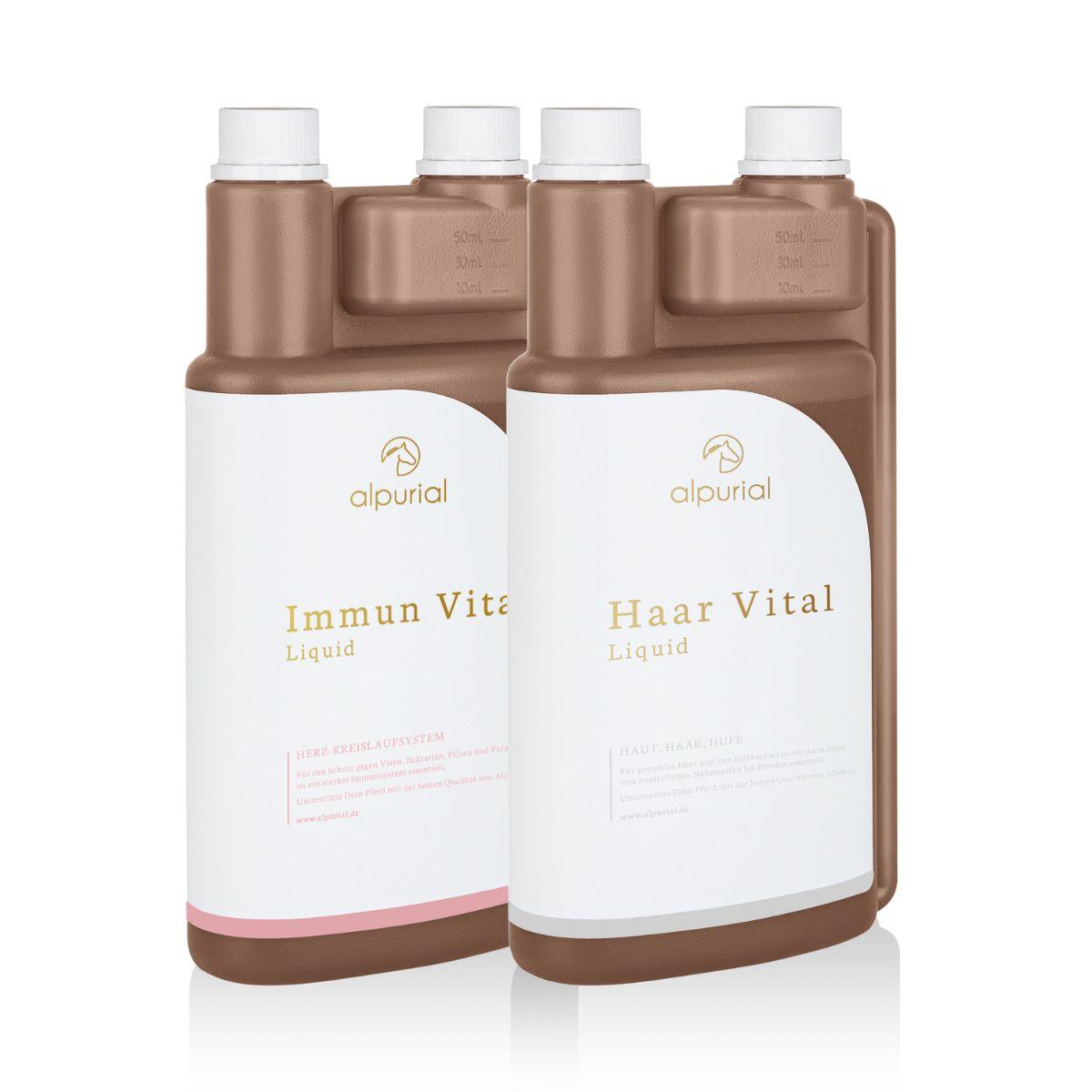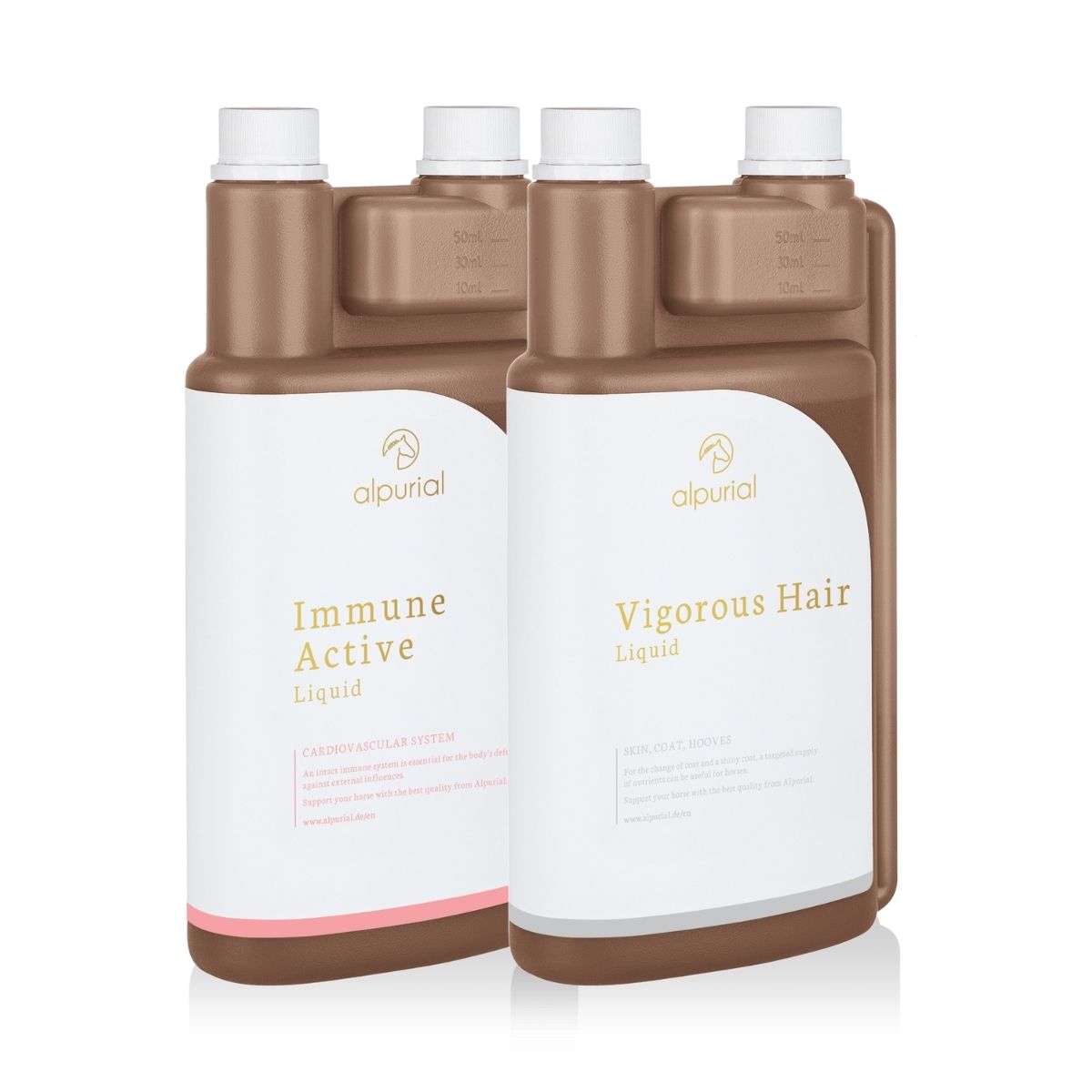
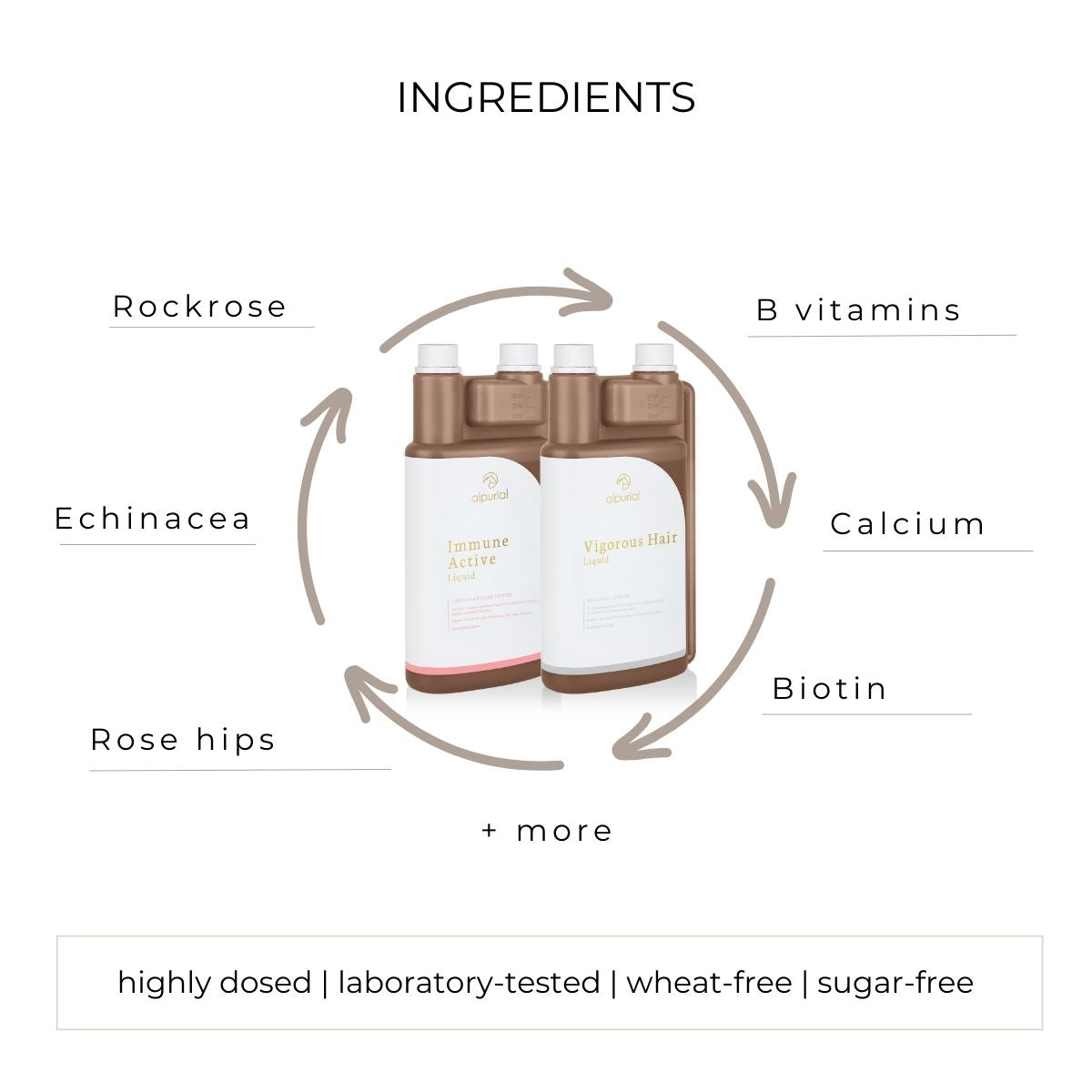
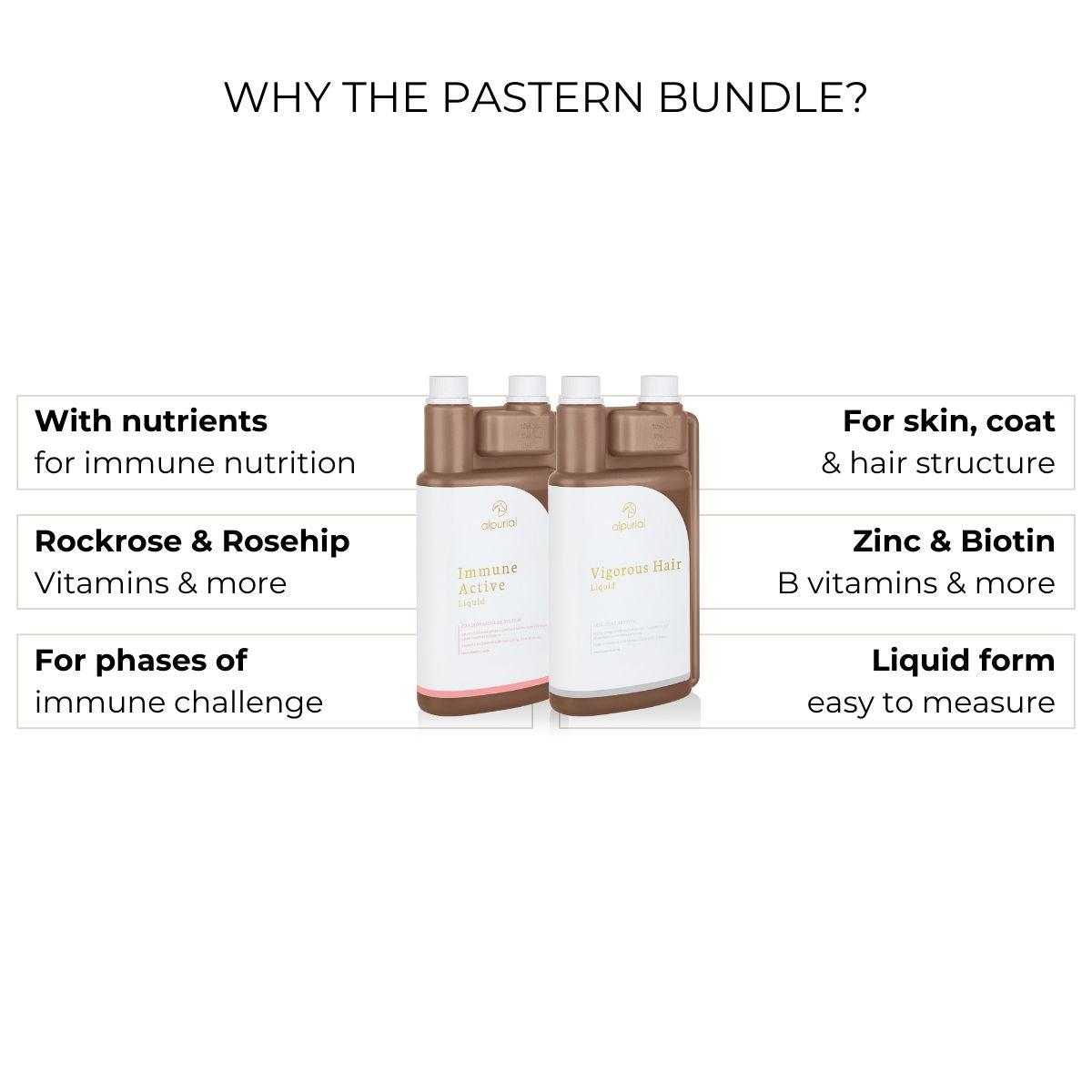
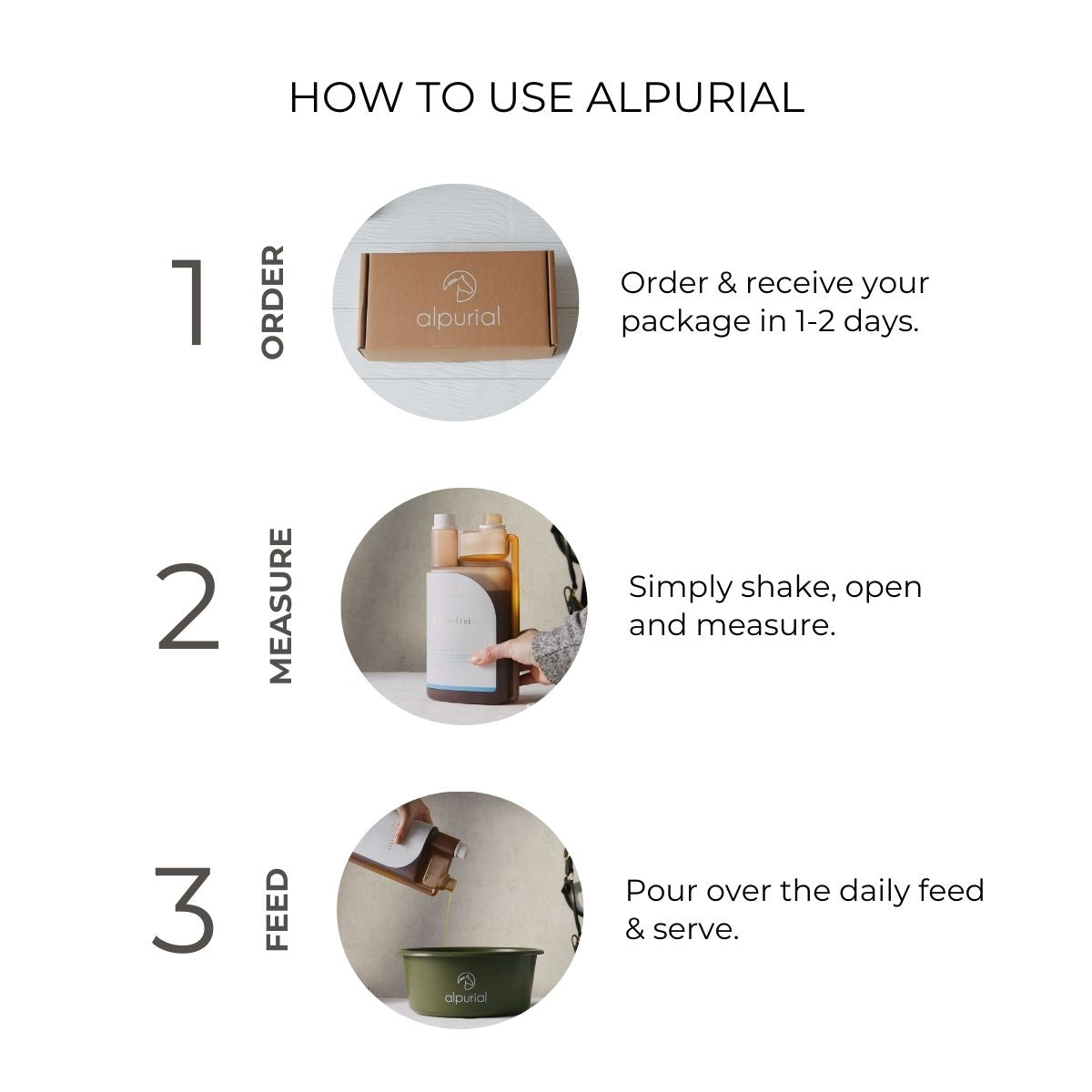
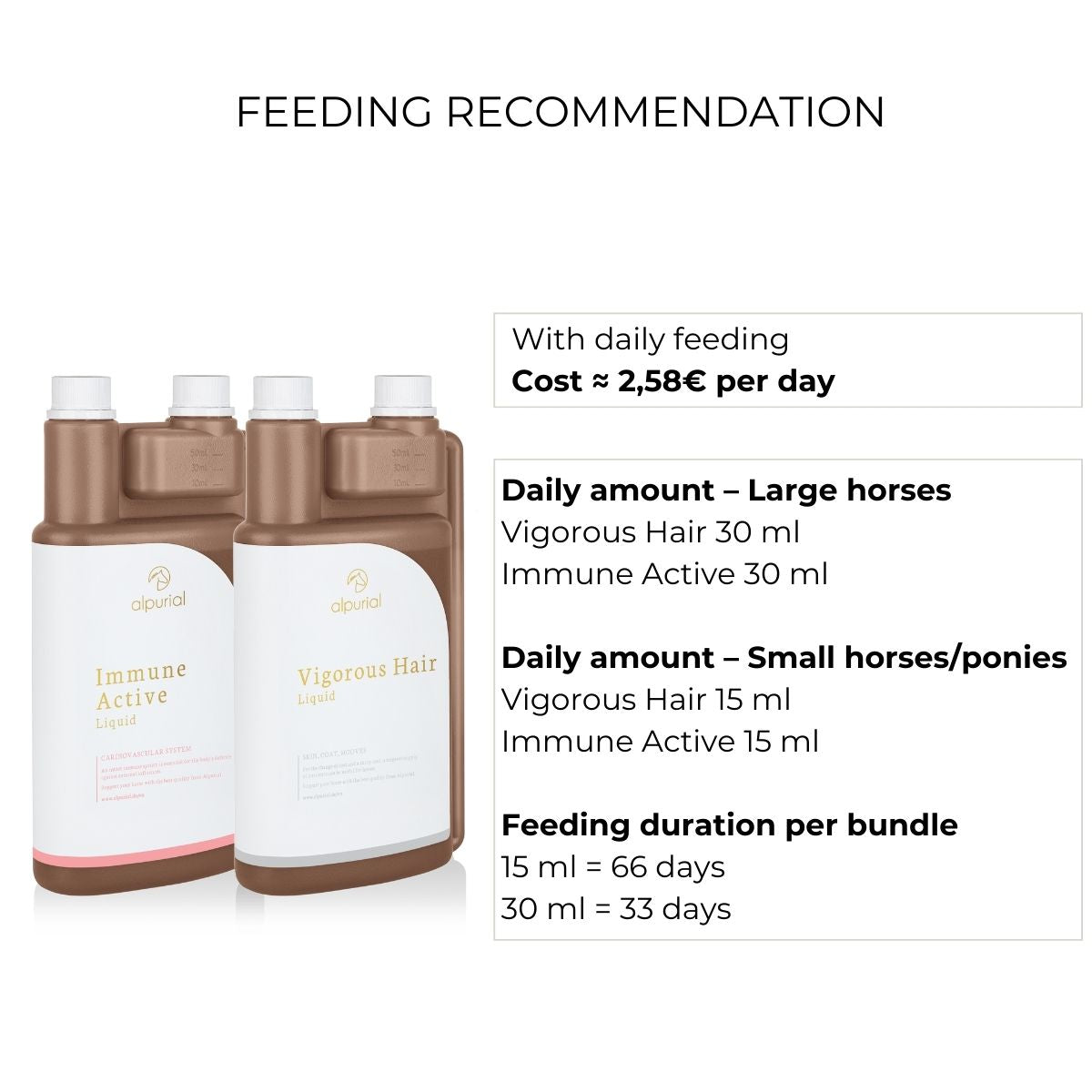
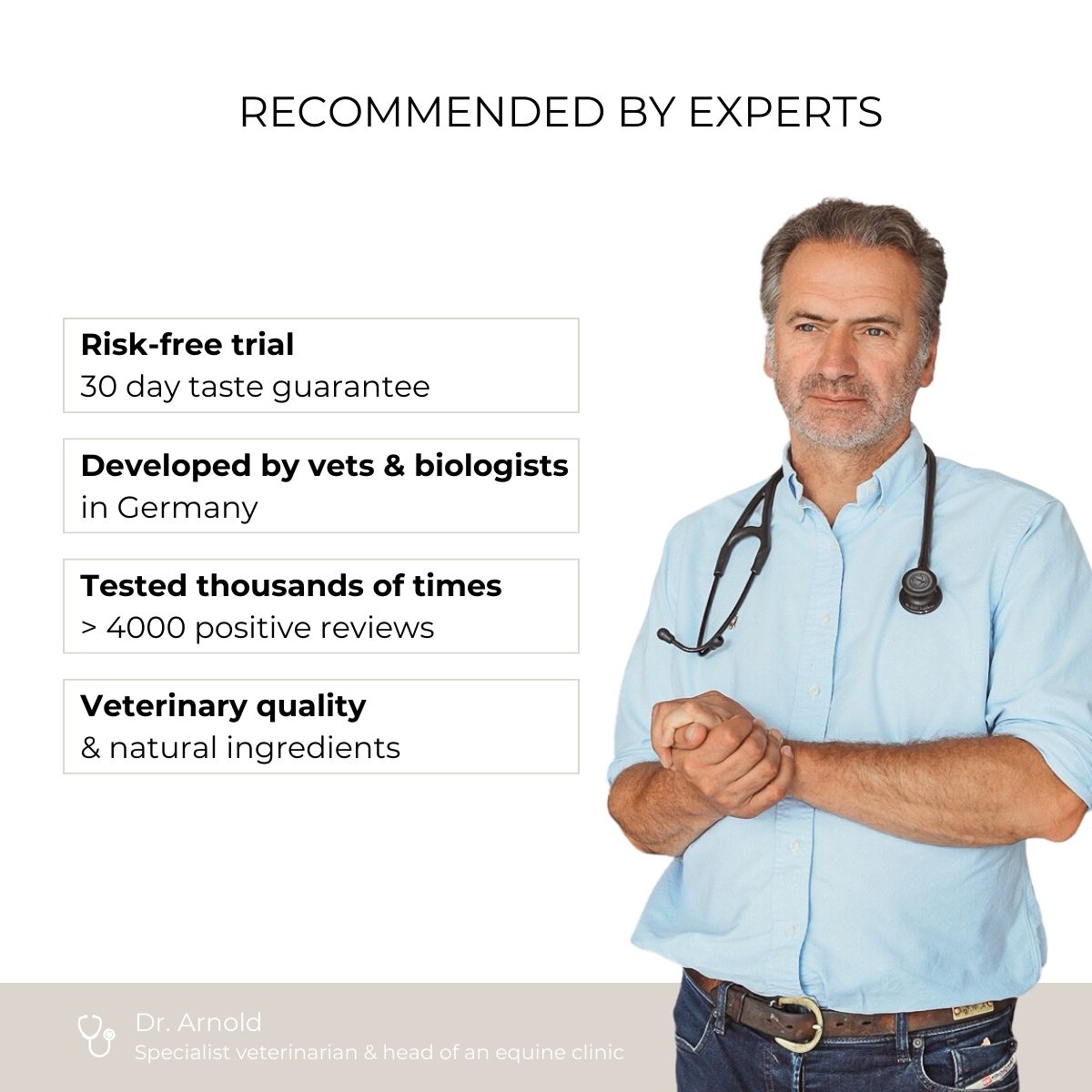
Pastern Bundle
Tax included.
In stock – delivered to your horse within 1–2 days.

Beatrice Mary, Anja Fee & over 40,000 customers love Alpurial products.
✓ For supplementary care in cases of feed-related increased demands – beyond external grooming
✓ With nutrients selected to support skin and coat through feed-related supplementation
✓ Contains rockrose, rosehip, zinc, biotin, and other carefully selected ingredients
✓ Ideal for daily feeding to contribute skin and coat condition through nutrition
Choose options






The Pastern Bundle combines two complementary feed products – Immune Active and Vigorous Hair – designed to support the daily nutritional needs of horses with delicate skin, especially in the pastern area.
Immune Active provides a carefully selected blend of vitamins, trace elements, and plant-based ingredients to support your horse’s well-being – especially during wet and cold seasons.
Vigorous Hair supplies essential nutrients such as zinc, biotin, and amino acids that contribute to a balanced intake supporting skin and coat condition.
The Pastern Bundle is suitable for horses of all ages and can be added to the daily ration, particularly in nutritionally demanding situations.
- Content: 1 litre per bottle
- RRP Vigorous Hair: €99.90 per litre
- RRP Immune Active: €89.90 per litre
- Vigorous Hair: show safe
- Immune Active: 48-hour withdrawal period
Daily amount for large horses
- Vigorous Hair 30 ml
- Immune Active 30 ml
Daily amount for small horses/ponies
- Vigorous Hair 15 ml
- Immune Active15 ml
Feeding duration per bundle
30 ml = 33 days
15 ml = 66 days
Expert recommendation
Feed at least 1 bundle, if necessary feed 1 more bundle.
Liquid supplements can be added to any type of feed and are generally better accepted by most horses than powders or pellets.
Feeding is that easy:
1. Shake the bottle and measure the dose
2. Distribute evenly over the feed
3. Feed your horse and see how much they enjoy it
Supplementary feed for horses
Vigorous Hair
Ingredients:
Vegetable glycerin; tasteless fish oil; methylsulfonylmethane (MSM) 3.00%; 1,2-propanediol; sodium caseinate
Analytical constituents:
Crude protein 3.5%; crude fiber 0.0%; crude fat 7.1%; crude ash 1.6%; sodium 0.06%; moisture 75.7%
Additives per liter:
Nutritional additives:DL-Methionine (3c301) 10,000 mg; Vitamin B1 (3a820) 175 mg; Vitamin B2 (3a826) 175 mg; Vitamin B6 as pyridoxine hydrochloride (3a831) 250 mg; Vitamin B12 (3a835) 750 mcg; Niacinamide (3a315) 1,150 mg; Biotin (3a880) 3,000,000 mcg; D-Panthenol (3a842) 225 mg; Folic acid (3a316) 50 mg; Zinc as glycine zinc chelate, hydrate (3b607) 5,000 mg; Manganese as glycine manganese chelate, hydrate (3b506) 3150 mg
Technological additives:
Citric acid (1a330) 800 mg; Lactic acid (1a270) 3200 mg; Sorbic acid as potassium sorbate (1k202) 1119.45 mg; Formic acid from sodium formate (1k237i) 203.01 mg; Propyl gallate (E 310) 80 mg
Immune Active
Ingredients:
Vegetable glycerin; 1,2-propanediol; colostrum; ground rosehips; ground turmeric root; propolis
Analytical constituents:
Crude protein 5.8%; crude fiber 0.4%; crude fat 3.2%; crude ash 0.5%; sodium 0.09%; moisture 80.6%
Additives per liter:
Nutritional additives:
Vitamin A (3a672b) 400,000 IU; Vitamin D3 (3a671) 80,000 IU; Vitamin E (3a700) 20,000 mg; Vitamin B1 (3a820) 1,000 mg; Vitamin B2 (3a826) 1,800 mg; Vitamin B6 as pyridoxine hydrochloride (3a831) 1,700 mg; Vitamin B12 (3a835) 12,000 mcg; Niacinamide (3a315) 16,000 mg; Biotin (3a880) 30,000 mcg; D-Panthenol (3a842) 4,000 mg; L-Arginine (3c361) 10,000 mg
Sensory additives:
Echinacea tincture 10,000 mg; Cistus extract 100,000 mg
Technological additives:
Citric acid (1a330) 840 mg; Lactic acid (1a270) 3,200 mg; Sorbic acid as potassium sorbate (1k202) 1,539 mg; Butylated hydroxyanisole (BHA) (1b320) 96 mg; Propyl gallate (E 310) 96 mg
📦 Free & fast shipping from 39€
🐴 Horse doesn't like it? Money-back guarantee!
🤝 Fair prices guaranteed.
Ingredients
Know what's inside: We use highly concentrated ingredients to minimize the daily feeding amount. This makes your product last longer.
Vigorous Hair
Biotin is associated with the natural metabolism of skin, coat and horn. It plays a central role in the formation of keratin – an important structural protein found in skin, hair and hooves. Adequate biotin supply is valued in horse nutrition as part of maintaining coat shine and horn quality.
Zinc is an essential trace element connected with normal cellular metabolism. In horse nutrition, zinc is linked to the condition of skin, coat and horn and is considered important for maintaining a healthy appearance.
MSM (methylsulfonylmethane) is a natural source of sulfur that occurs in pasture grass, young forage and certain vegetables. Sulfur is a natural building block of the body and is found in skin, connective tissue, hair and hooves. In horse nutrition, MSM is valued for providing nutritional support for these structures, particularly during phases of high demand.
Vitamin B1 (thiamine) is a water-soluble B vitamin that naturally occurs in cereals, yeast and plant-based feed materials. It is linked to energy metabolism and is associated with nutritional aspects of skin, coat and hoof condition. Adequate supply is considered useful, especially in times of increased demand.
Vitamin B2 (riboflavin) is a water-soluble B vitamin that naturally occurs in herbs, cereals and yeast. It is connected with cellular metabolism and mentioned in relation to skin and hoof nutrition. A balanced supply is valued in horse feeding as part of maintaining healthy skin and hoof structures.
Niacinamide (vitamin B3) is an essential B vitamin that naturally occurs in plant-based feed materials, yeast and cereals. It is connected with numerous enzymatic processes and is associated with energy metabolism. Niacinamide is also mentioned in relation to physiological aspects of skin, muscles, digestion and the nervous system.
Vitamin B6 (pyridoxine) is a water-soluble B vitamin that naturally occurs in yeast, cereals and plant-based feed materials. It is linked to amino acid and fatty acid metabolism and is associated with nutritional aspects of skin and liver function.
Vitamin B12 (cobalamin) is an essential B vitamin that is found particularly in animal-derived feed materials such as fermented products or brewer’s yeast. It is connected with energy metabolism and is also referenced in relation to blood formation, cell function and nervous system processes. Adequate supply is valued in horse nutrition, especially during phases of high demand or in older horses.
Manganese is a trace element that is associated with various enzymatic processes – including energy metabolism and the formation of cartilage, bone and connective tissue structures. An adequate supply is valued in horse nutrition as part of supporting movement and resilience, particularly in active or sport horses.
Folic acid (vitamin B9) is an essential B vitamin that horses cannot synthesize themselves and therefore must obtain through feeding. It is connected with various physiological processes – including cellular metabolism and aspects of skin, coat and mane condition.
DL-methionine is an essential amino acid linked to the formation of keratin – a structural protein naturally present in skin, hair and hooves. Adequate methionine supply is valued in horse nutrition as part of maintaining coat and hoof quality, particularly during coat change, growth or phases of high demand.
Calcium is a macro element that is associated with various physiological processes – including energy metabolism as well as the function of cell membranes and nerves. In horse nutrition, an adequate calcium supply is valued as part of maintaining overall balance and normal body functions.
Immune Active
Rosehips naturally contain vitamin C along with a range of secondary plant compounds. In equine nutrition, they are traditionally used to support the diet of horses, particularly during periods of increased strain on the immune system.
Vitamin C is involved in physiological processes related to connective tissue, skin, joints, and the formation of horn.
Echinacea, also known as purple coneflower, is a traditional North American plant that contains secondary plant substances such as polyphenols and alkylamides. In horse feeding, echinacea is commonly used as a complementary ingredient during times of seasonal challenges or increased environmental stress, with particular attention to immune-focused nutritional support.
Cistus (Cistus incanus) contains naturally occurring secondary plant compounds such as polyphenols and flavonoids. In equine nutrition, it is traditionally used to complement the daily ration, especially during times of heightened external stress or seasonal shifts – with relevance to immune system-related nutritional considerations.
Turmeric root is rich in secondary plant compounds with antioxidant properties and is traditionally used in equine nutrition to support general well-being. It is commonly included in the ration of horses exposed to increased physical or environmental challenges – especially when nutritional support for skin, respiration, joints, or immune-related processes is desired.
Vitamin A is a fat-soluble vitamin used in horse feeding to support the nutritional supply of skin, mucous membranes, and immune function. It is involved in various physiological processes, including cellular metabolism, the maintenance of normal vision, and the nutritional maintenance of epithelial tissues.
Vitamin D3 is a fat-soluble vitamin used to support the calcium and phosphorus metabolism in horses. It plays a role in physiological processes related to bone development and immune function – particularly in horses with limited exposure to sunlight or during periods of increased physical strain.
Vitamin C is a water-soluble vitamin used in equine nutrition as part of the nutritional support during periods of increased demand. It is involved in physiological processes related to connective tissue and contributes to the protection of cells from oxidative influences.
Vitamin E is a fat-soluble vitamin with antioxidant properties. It contributes to protecting cells from oxidative influences and is involved in physiological processes related to muscle metabolism. A demand-oriented supply of vitamin E can be relevant for horses under physical strain, as part of a balanced feeding approach.
Niacinamide is an essential B vitamin naturally found in plant-based feed materials, yeast, and cereals. It is involved in numerous enzymatic processes and plays a role in normal energy metabolism. Niacinamide also contributes to physiological functions related to skin, muscles, digestion, and the nervous system.
Thiamine is a water-soluble B vitamin naturally found in cereals, yeasts, and herbs. It is involved in normal energy metabolism and plays a role in physiological functions related to the nervous system and muscles. A demand-oriented supply may be relevant in phases of increased physical workload.
Riboflavin is a water-soluble B vitamin present in herbs, cereals, and yeast. It is involved in cellular metabolic processes and plays a role in physiological functions related to skin and hoof tissue. A balanced intake supports the nutritional maintenance of skin and hoof structures.
Pyridoxine is a water-soluble B vitamin naturally occurring in yeast, cereals, and plant-based feed materials. It contributes to physiological processes related to amino acid and fatty acid metabolism and supports the nutritional supply for skin and liver function.
Vitamin B12 (Cobalamin) is an essential B vitamin primarily found in animal-based feed components such as fermented products or brewer’s yeast. It is involved in normal energy metabolism and plays a role in physiological processes related to cell function, nervous system activity, and blood-related metabolic pathways. A demand-oriented supply of vitamin B12 may be relevant for horses with increased physical workload or in older age.
Biotin is involved in the natural metabolic processes of skin, coat, and horn. It plays a key role in the formation of keratin – a structural protein naturally found in skin, hair, and hooves. A balanced supply of biotin contributes to the nutritional maintenance of coat shine and horn quality.










Frequently Asked Questions
about the Pastern Bundle
The bundle lasts approximately 1 month. For ponies or small horses, it can last up to 2 months.
The feeding duration should be considered individually. Thanks to their natural ingredients, both Immune Active and Vigorous Hair can be fed continuously.
For cases of pastern dermatitis, we recommend feeding at least until the skin barrier has fully regenerated.
All our products can be prepared in advance for feeding. We recommend a maximum preparation time of 24 hours.
Supplementary feed for horses
Daily amount for large horses
- Vigorous Hair 30 ml
- Immune Active 30 ml
Daily amount for small horses/ponies
- Vigorous Hair 15 ml
- Immune Active 15 ml
No worries – 99% of horses eat both - Immune Active and Vigorous Hair - without any problems when mixed with concentrate feed. You can also prepare it in mash. And if your horse doesn’t like it, our 30-day Taste Guarantee ensures you’ll get your money back.
Absolutely.
With the Pastern Bundle, you can support your horse’s immune defenses from the inside out, while also promoting healthy coat renewal with Vigorous Hair.
In most cases, improvement becomes visible after about 1–2 weeks. However, this can vary from horse to horse.
There are no restrictions on the Pastern Bundle. It can be used for all horses of all ages.
Immune Active should not be fed to pregnant mares. Vigorous Hair can be fed to pregnant mares.
Immune Active and Vigorous Hair are both show safe, meaning it is not doping-relevant.
Shelf life
The ordered products have a minimum shelf life of 6-12 months.
QUICK & EASY FEEDING
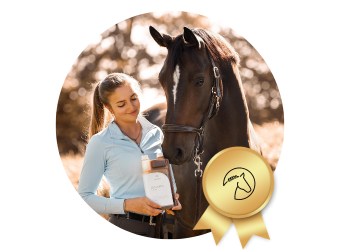
Taste guarantee
30-day money-back guarantee! All information about the guarantee can be found in the terms and conditions.
